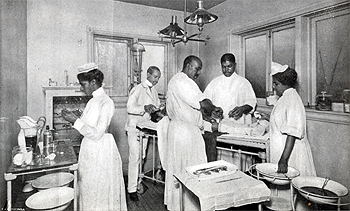
Frederick Douglass Memorial Hospital operating room (Courtesy of National Library of Medicine)
Celebrating Black History Month every February, Americans share stories and host events to educate the public on the achievements and struggles of African Americans throughout history.
“Black culture is American culture, and Black stories are essential to the ongoing story of America — our faults, our struggles, our progress, and our aspirations,” said President Joe Biden in his 2022 proclamation on Black History Month.
This year’s theme of Black Health and Wellness celebrates the contributions of Black academics and medical practitioners to the field of medicine. As the COVID-19 pandemic continues to strain hospitals, this topic is more prevalent than ever.
Black History Month has a long history leading up to the level of involvement and acknowledgment as seen today.
In fact, Black History Month was not always a month.
Historian Carter G. Woodson was born to a poor family on Dec. 19, 1875, in New Canton, Virginia. To encourage scholars to embrace Black heritage and accomplishment, Woodson founded the Association for the Study of Negro Life and History (ASNLH) in 1915.
“If you teach the Negro that he has accomplished as much good as any other race he will aspire to equality and justice without regard to race,” said Woodson in his book “The Mis-Education of the Negro.”
Later in 1926, Woodson and ASNLH created Negro History Week in February. The week was intentionally aligned with Abraham Lincoln and Frederick Douglass’ birthdays. Negro History Week gained popularity as schools hosted celebrations and lectures.
On Feb. 10, 1976, 50 years after the event’s birth and 16 years after Woodson’s death, President Gerald R. Ford gave a speech in observance of the expansion of Negro History Week to Black History Month.
“We can seize the opportunity to honor the too-often neglected accomplishments of Black Americans in every area of endeavor throughout our history,” Ford said.
Since Ford’s speech, every American president has spoken on Black History Month.
ASNLH, now the Association for the Study of African American Life and History (ASALH), continues to teach Black history and lead events during Black History Month. It is the organization that designates the theme for each February.
Alongside the creation of Negro History Week, Woodson decided that the themes for each year would unite the public and shed light on important issues.
This year’s theme aims to explore the impact of texts and groups as simple as “Doc McStuffins” or as major as Black-founded community clinics.
“There’s a long list of professional organizations, of health care professionals, of hospitals, nursing schools in which African Americans have created and, of course, participated,” said ASALH President Dr. Marvin Dulaney during the 2022 Black History Month Festival on Sunday.
CU Boulder’s Contribution
In a message to faculty, staff and students, Chancellor Philip DiStefano said, “We are better together, and only by supporting one another and campus initiatives like these can we create an academic community that reflects the positive change we want and need to see around us.”
On Feb. 8, 2022, the Center for Inclusion or Social Change hosted the annual Spring Diversity and Inclusion Summit.
It featured a keynote presentation by Dr. Russell Wiggington, president of the National Civil Rights Museum in Memphis, Tennessee, and a talk led by CU Boulder professor and founding director for the Center for African & African American Studies Reiland Rabaka.
CU Boulder also invites students to participate in the #BeTheChange Challenge, organized by the student-run Leeds MBA Justice, Equity, Diversity and Inclusion Committee.
The challenge encourages the CU Boulder Community to explore Black history through reflections, articles, movies and more. The website includes a calendar to guide the journey and provide links to texts. The activities started on Jan. 31, but there is still plenty to participate in through Feb. 27.
Beyond participating in activities through the #BeTheChange Challenge, there are plenty of other opportunities to support Black community members this month.
The Barney Ford Diversity Scholarship Fund is accepting donations for a scholarship that promotes diversity in the Leeds School of Business MBA program.
In Denver, the Blair-Caldwell African American Research Library welcomes all learners to explore historical archives and speak with librarians.
“Black History Month is very integral when it comes to celebrating and putting out information about Black History,” said senior librarian Jameka Lewis at a virtual presentation Saturday. “Please feel free to reach out to us, and we’d love to be able to refer you(…)to other resources.”
Outside of traveling, a plethora of exhibits, collections and articles can be explored through the Black History Month website or CU Boulder students. Black history can be explored through many types of media and at the researcher’s convenience.
“What we need is not a history of selected races or nations, but the history of the world void of national bias, race hate, and religious prejudice,” Woodson said.
Contact CU Independent Staff Writer Bella Hammond at Isabella.Hammond@colorado.edu.
